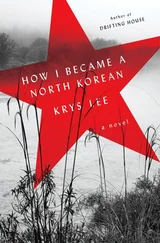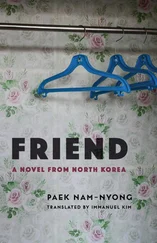It took me hours to return the way I had run. I found footprints where I had trampled the grass, but they soon disappeared. I looked for familiar landmarks, but I hadn’t been outside the cave since my arrival. I was lost. It was still day, but in the mountains nobody could guess when darkness would fall. I hoped I wasn’t too far from the cave.
I looked around me. The wind was chilly in the mountains, but I felt spring had arrived in earnest. Everywhere the trees were green with new growth. I tried to walk in a straight line, but I couldn’t be sure I was going the right way. I prayed I might run into someone returning from town, but I encountered no one. I heard the sound of water flowing in the distance.
Eventually, the sky turned completely dark, and I couldn’t see two paces in front of me. I wondered if I should stop for the night. I stood still, afraid to move and afraid not to move.
So many people escaped to China only to land in more trouble than before, spending every moment in fear, worrying for their safety. The darkness of the mountains engulfed me. What ani I looking for in this strange place? I wondered. Where are my friends?
Each question led to another. My strength and desire were gone. I didn’t have a destination. Other people had goals. Some people, after getting to China, tried desperately to travel onward to other, safer countries. Others wanted to return to North Korea with money and food. What were my goals? Right now I was looking for the cave. But after that? What do I seek here?
My whole life, I had been a runaway: I had slipped away from my real family; I’d run away from myself until I reached what seemed like the darkest corner of the Earth.
Before escaping to China, I had reasoned that class status was unimportant in China, that I would not be judged here. I wouldn’t have to feel the guilt of shouting the daily slogans at the hotel before the Great Leader’s picture, pretending to be an upright citizen. But now, despair overwhelmed me. I was not welcome here either. In China I am just another kind of criminal, wandering around in the darkness and running away in fear of being caught. Will there ever be a happy outcome to my life? If I were to die here, no one would know.
A lump of anger burst in my chest. My parents had broken the rules, and that made me a criminal too, but what did they do that was so bad? I thought of the dancers at the hotel. I was crazy with jealousy, imagining their happy faces, their happy stories with their families. Now I could be honest with myself: I was madly envious. I was born unwelcome. Struggling like this seemed pointless. My birth was unwelcome, but at least my death would be welcome—to me, anyhow. My body lay crumpled on the grass; perhaps this was my destiny. I felt like the seven-year-old girl who was abandoned in the forest, hoping Uncle Shin would find her. But the scared woman lying in the grass now didn’t have anything or anyone.
At that moment, I heard the sound of repeated whistling. It didn’t sound like an animal. It was getting closer, and I stood up abruptly and whistled back. The whistling stopped; only silence from the other side. Was it human? Who was it? I crept down again and lay still in the grass. It could be a friend, but it could be an enemy. Another whistle, closer this time. Looking in the direction of the sound, I could see a black figure illuminated slightly by the stars.
I grabbed the long branch that I had used to beat a path.
The figure closed in on me, whistling again, then spoke quietly. “Jia… Are you Jia?” It was a man’s voice, a strange voice, but he knew my name.
I swung the branch at him. I had nothing to lose anymore. “Right here! Who are you?”
He stopped. “Where are you?”
I stood up and approached him; his eyes gleamed in the darkness. It was a man who had been staying in the cave, a man who knew Sangwon. I remembered his face.
He was relieved. “Oh! You were here. You don’t know how Sangwon worried about you. Come on, I’ll take you back.”
The Chinese police had captured several escapees outside the cave that day, most of them old people incapable of running away. When Sangwon returned and saw that I wasn’t there, he became frightened. A woman who had watched the struggle with the policemen reassured Sangwon that I wasn’t one of those who were captured. Sangwon wanted to find me, but this man stopped him and said he would look for me instead. He knew Sangwon couldn’t find me with his injured leg.
When we arrived back at the cave, Sangwon sprang to his feet, staring at me with relief. I patted his bare head and said, “I ran straight ahead, without looking back, the way you taught me.” We sat in silence as he picked the weeds from my clothes. There were tears in his eyes.
I decided not to dwell any further on the questions that had arisen outside in the dark. Sangwon, too, had wandered in darkness. Despite his determination and optimism, I could see fear and despair in his eyes. He always told me we would only be partners until we found a safe place, but he was afraid of losing me and being alone. He needed someone he could lean on, too. He needed someone to give him a reason to struggle, to keep hope alive. Just as dancing had become my purpose after being rejected by my grandparents at the orphanage, I was what Sangwon needed now. I didn’t want to break his heart; I knew I couldn’t disappoint him. We were not merely partners for survival. We gave each other hope.
Grandmother’s place in the cave was empty. No sooner had her wounds healed than she had fallen victim to an even greater disaster.
There were regular visitors to the cave whom nobody welcomed. They called themselves intermediaries; they said they could help us start new lives, that they knew all the good jobs in China. But no one trusted them. They were only nice to the young women; when they came to the cave, they looked around for new faces. After Sangwon and I had been there for a week, three of them showed up.
“How’s everything?” one asked.
They lounged about the cave, checking each person’s face to see who was new. People just sat quietly or nodded their heads to the uninvited guests. The only reason they came was to persuade young women to go to town with them; women and children could get more food in town than a man could. If the men in the cave told them a woman didn’t want to go with them, the strangers couldn’t force her, but if she wanted to leave with them, nobody could stop her. We all knew they could report us to the police anytime they wished.
Ignoring the visitors, I hugged Sangwon and pretended to sleep. One of them spotted us, however, and drew near. He nudged Sangwon in the ribs and said, “Hey, Sangwon. You cane back. We wondered if you were okay. We haven’t seen you for a long time. Is your leg any better?”
He made Sangwon stand up. “Who is this woman?” he asked. “We haven’t seen her before, right?”
He looked around at the others, but they kept their heads lowered. Moving his face close to mine, he called loudly to his friends, “Hey, check out the new face!”
The other men approached and Sangwon glared at them, shouting, “She’s my mom. Nothing interesting to you guys.”
They pushed Sangwon away and dragged me to my feet. “Sangwon, we know your mom is dead. Sorry about that,” the man said. He snickered.
The strangers watched my face intently. “She looks too young to be your mom, anyway,” one of them said.
They surrounded me. One of them leered, “This place isn’t so comfortable for you. Is it, young lady?” He sat down and grabbed my hand. “You haven’t experienced the harsh world yet. Your white hands and face show it.”
Sangwon barked at them, “Don’t touch her. I said she’s my mom.”
Читать дальше












